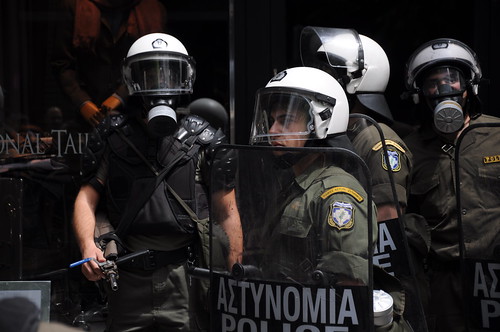
I suppose it is natural when faced with new and unsettling situations to turn to tried and tested solutions. This certainly seems to be the case with the Greek government who are in a historically retrospective frame of mind.
Recently, the ruling PASOK party decided that the private sector would be better suited to the job of collecting tax, an idea almost as old as civilisation itself. In Ottoman times it was named Iltizam with the state auctioning off taxation rights to the highest bidder (any connection between and the current greek system of road tolls is purely coincidental). A similiar set up known as the Ferme Générale was also used to great effect by Louis XVI, well, at least until outraged tax payers helped liberate the Sun King's head from the rest of his body during the French Revolution.
Also dating from this period the Greek government headed by the son of a political refugee and immigrant is in the process of restoring the18th century prison hulk for immigrants entering the country via Turkey. Αccording to the Vima newspaper 300,000 euros per year will be spent on renting a Dutch owned prison ship which will be anchored off the coast near the northern city of Alexandroupoli. The fact that such a vessel can be towed out to sea means that it is far away from such interfering busy bodies as the UNHCR and Amnesty International who have regularly condemned the conditions under which immigrants in detention are held.
As with the idea of privatised tax collection the prison ship has a long and glorious history which does it credit. Just ask the Nazis and Chile's Pinochet regime who made use of this wonderful innovation. Add a touch of malnutritian and a case or two of scurvy and the glory days of the 1800's are once again yours.
Those of a more modern turn of mind might be able to see similarities between Athens handling of public protests over the building of a landfill site in the Keratea region near Athens and those that followed the Japanese government's attempts to extend the Narita airport from the late 60's till the 70's. In both cases the government believed that the best way to promote devlopment was through the liberal apllication of riot police, tear gas and violence. In this case Giorgos Papandreou is no slouch and has employed the quasi - military MAT special police units with an elan that would make his fellow members (well, till last month) of the Socialist International Hosni Mubarak and Ben Ali green with envy.
Like the Narita example, villagers and local inhabitants of towns in the area have been fighting long and bitter battles with the authorities for other 70 days. While the government insists that the rubbish dump is necessary for the future of waste deposal in the capital the type of facilities it is promoting is due to be phased out in the EU within two years according a blog written by residents.
The reality of the situation is the current administration is clutching at straws, left staggering from a series of politically damaging gaffes and losing supporter at an ever increasing rate the PASOK leadership is desperately attempting to claw its way out of the hole which it has dug for itself by promoting even the most improbable of policies in the hope that voters will be convinced that it is doing something positive for the country.
can citizens start their own recycling project where they take control of waste resources and work together to reformat waste internally in co-operation with one another?
ReplyDeleteI like this and previous article. In reference to both, I would like to add
ReplyDelete1) Stuctural reforms or 'internal devalution', in theory, work only if they act on both prices and wages. With monopoly and Cartels,they fail to work as costs are not absorbed but are passed on to consumers. Failing to directly address the power of monopolies and cartels, will only deepen the economy's structural problem. Reforms might appear to work as the numbers add up in the government's account books by redistributing from those who have monopoly power to those who don't. Small business, who tend to be more competitive, will be the first once to disappear. Your reference to Ottoman history is appropriate as it seems the reforms are just another loop in the circle. The monopolies and Cartels will survive and there are plenty of ways of making money from ..........
2) Privatisations - G Stiglitz has more accurately called this, 'Briberisation.'
Albert